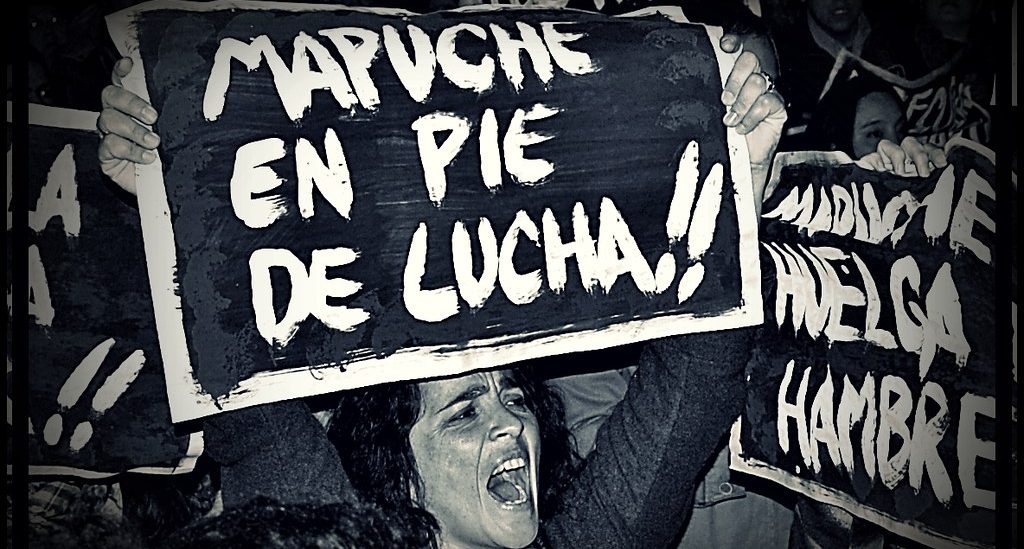
PRESS RELEASE
Chile: Violations of the Mapuche People’s Right to Self-Determination Raised Again at the UN
Geneva, Santiago de Chile, 25.03.2025
On 20 March 2025, during the 58th session of the UN Human Rights Council, Hector Llaitul Carrillanca, a Mapuche community member currently imprisoned, through his lawyer Alberto Espinoza and with the support of CETIM, brought a new complaint before this multilateral human rights forum against the State of Chile. The accusation: flagrantly violating international human rights law regarding the ancestral Mapuche people inhabiting the territory known as Walmapu.
Previously, the Coordinadora Arauco-Malleco (CAM) and CETIM had already denounced the violations of the rights of the Mapuche people in 2017 and 2018 (1).
Since the formation of the Chilean State — and even earlier, under Spanish domination — the Mapuche people have been subjected to a systematic and widespread policy of persecution, discrimination, racism, and criminalisation due to their resistance to domination and their long-standing struggle for their territory. This fight is also for the preservation of their cultural practices, which are deeply rooted in the land. For the Mapuche people, the land holds political, economic, and cultural significance, tied to sovereignty, autonomy, life, social integrity, and a worldview unique to this ancestral people.
In the struggle for the reclamation of lands usurped by settlers supported by the State of Chile, the Mapuche people have been persecuted, establishing an institutionality that serves repression, militarising the ancestral territory of Walmapu, declaring a constitutional state of emergency, disregarding the right to self-determination, and subjugating and subordinating Mapuche culture to a capitalist, extractivist economic model, which has impacted their way of life and their sovereignty as a people.
Lands designated for farming and historically part of Walmapu are now in the hands of forestry companies, depriving the Mapuche people of their territory, access to water, and natural resources.
The Chilean state has developed legislation inherited from the military dictatorship to repress and criminalise the Mapuche people, such as the Anti-Terrorism Law and the State Security Law, which have allowed the executive, legislative, and judicial powers to work together with the same repressive goal, ignoring the application of ILO Convention 169 on Indigenous Peoples. This has been manifested in the relentless and personalised persecution of Héctor Llaitul Carrillanca, Werken (spokesperson) and leader of the Coordinadora Arauco-Malleco (CAM), who was imprisoned and tortured during the Pinochet dictatorship and is currently sentenced to 23 years in prison, 15 of which are for inciting violence due to his opinions and speeches advocating for Mapuche territory and cultural autonomy. He is serving this unjust and arbitrary sentence under an inhumane and degrading prison regime, which directly affects his right to life, physical and mental integrity, and cultural rights. This criminal persecution has extended to his son, Pelentaro Llaitul, for whom the Public Prosecutor’s Office and the Ministry of the Interior under President Boric’s government are seeking a 100-year prison sentence.
Héctor Llaitul and CETIM urged the Chilean State to respect its international human rights commitments. They also demanded an end to the militarisation of Walmapu (Mapuche territory), the release of all Mapuche political prisoners, and the cessation of inhumane and degrading prison regimes. They further called on the Human Rights Council to adopt measures to ensure and respect the rights of the Mapuche people, such as the right to self-determination. The CAM joins this call in all its terms.
Watch the video of the intervention with english subtitles
Contact: Raffaele Morgantini, Representative of CETIM at the UN, raffaele@cetim.ch
Notes:
(1) Actions and advocacy initiatives for the respect of the rights of the Mapuche People developed by the CETIM, in alliance with CAM, in 2017 and 2018: